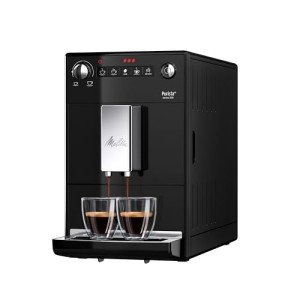Home Use Espresso Machines: A Comprehensive Guide
Espresso machines have ended up being a staple in many families as coffee enthusiasts seek to duplicate café-quality brews in the convenience of their cooking areas. The increase in appeal has actually caused a varied market filled with different models, features, and prices. This post intends to provide a useful overview of home use espresso machines, helping readers navigate their alternatives efficiently.
Comprehending Espresso Machines
Espresso machines work by requiring hot water through finely-ground coffee under high pressure, leading to a concentrated coffee beverage called espresso. There are a number of kinds of espresso machines classified based on their developing methods and level of automation. The most common types include:
- Manual Espresso Machines: These need the user to control the pressure and water flow, enabling a more hands-on coffee-making experience.
- Semi-Automatic Espresso Machines: These offer automatic control over water pressure, while the user manually grinds and tamps the coffee.
- Automatic Espresso Machines: With the push of a button, these machines immediately manage the circulation of water, making it much easier to brew espresso with consistent results.
- Super-Automatic Espresso Machines: These all-in-one machines manage grinding, tampering, brewing, and even milk frothing, making them perfect for users trying to find convenience.
- Capsule or Pod Machines: These use pre-packaged coffee pods to produce espresso with minimal effort, but they restrict choice in brewing methods and tastes.
Table: Comparison of Espresso Machine Types
| Type | Control Level | Alleviate of Use | Cleaning Level | Perfect For |
|---|---|---|---|---|
| Manual | User-controlled | Moderate | High | Coffee purists |
| Semi-Automatic | Partial automation | Moderate | Moderate | Home baristas |
| Automatic | Totally automated | Easy | Low | Busy people |
| Super-Automatic | Totally automated | Very easy | Really low | Convenience applicants |
| Capsule/Pod | Totally automated | Very easy | Really low | Casual drinkers |
Secret Features to Consider
When selecting a home use espresso machine, it's vital to think about various features that can considerably impact the quality of espresso and user experience.
- Pressure: Look for machines that provide at least 9 bars of pressure, as this is considered optimum for developing espresso.
- Boiler Systems: Single vs. dual boiler systems determine temperature stability and the ability to brew espresso and steam milk at the same time.
- Grinder: Integrated mills permit newly ground coffee, which improves flavor. Think about machines with adjustable grind settings.
- Milk Frother: For those who take pleasure in cappuccinos and lattes, an integrated steam wand or automatic frother is important.
- Size and Design: Consider your kitchen area and aesthetic choices. Machines can be found in various sizes, from compact to large setups.
- Price: Home espresso machines can vary from a couple of hundred to a number of thousand dollars, so it's important to develop a budget before exploring options.
Pros and Cons of Home Use Espresso Machines
| Pros | Cons |
|---|---|
| Convenience of brewing coffee at home | Preliminary financial investment can be high |
| Quality of espresso is frequently remarkable | Needs some skill, particularly with manual machines |
| Capability to try out flavors | Upkeep and cleaning can be labor-intensive |
| Can conserve money in the long run | Not all machines will match every coffee preference |
Upkeep and Cleaning Tips
Keeping an espresso machine is crucial for lengthening its life and guaranteeing consistent brew quality. Here are some useful pointers:
- Regular Descaling: Minerals from water can develop in the machine. Descale every 1-3 months, depending on water firmness.
- Daily Cleaning: Rinse portafilters, baskets, and steam wands after each use to prevent coffee oils from developing residue.
- Use Filtered Water: This can help in reducing mineral buildup and improve the taste of coffee.
- Replace Gaskets and Seals: These elements may wear over time and must be changed to preserve pressure and performance.
- Check out the Manual: Each machine has particular care directions; following these will ensure durability.
FAQs About Home Use Espresso Machines
Q1: What is the very best budget espresso machine?The best budget espresso machine often depends upon private requirements, but designs like the DeLonghi EC155 or the Breville Bambino are popular amongst users for supplying excellent value. Q2: How long do home espresso machines typically last?With Espresso Machines With Milk Frother , home espresso machines can last anywhere from 5 to 15 years, depending on the quality of the machine and frequency of use. Q3: Can I make coffees and lattes with any espresso machine?While most espresso machines can make coffees and lattes, having a reputable
steam wand or frother is important for attaining the right milk texture.
Q4: Are super-automatic machines worth the investment?For those who focus on benefit and fast brewing, super-automatic machines can be worth the investment, though they may lack some customizability in brew strength and taste. Q5: What kinds of coffee beans are best for espresso?While personal preference plays a function, beans identified as" espresso "blends are generally roasted darker, producing abundant tastes and a velvety texture when brewed.
Buying a home espresso machine can transform the everyday coffee routine into something unique, elevating home brews to café quality. By comprehending the various types of machines, crucial features to consider, upkeep needs, and weighing the
advantages and disadvantages, consumers can make educated choices that match their individual preferences. As the espresso culture continues to grow, no matter the choice, every brew can be a tasty experience waiting to be relished.

